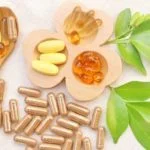
Allergies
Treating Histamine Intolerance With Natural Supplements
Oct 7, 2019H2 blockers like Zantac are often used in conjunction with an antihistamines like Zyrtec, Allegra, and Benadryl to alleviate symptoms of histamine intolerance. Cromolyn sodium is another staple medication for those with severe histamine intolerance symptoms. “While medications do help, they may have side effects. And like many other drugs, they don’t target the root cause of the problem.” They’re essentially a band aid on the issue, meaning you’ll likely continue to need them. And if we go by popular experience, you’ll need higher doses over time. Ergo, the case for histamine intolerance supplements.
If these medications bring you relief and you’re more comfortable taking them, then by all means, continue. But you can still use nature’s medicine cabinet in the meantime to remedy the underlying issue, like bringing down overall inflammation in the body. And do balance out your gut flora so that you have more good bacteria than bad.
Histamine Intolerance Supplements And Probiotics: Use Wisely
From the gut connection in histamine intolerance, it would seem that probiotics would help deal with the problem in a big way. They indeed can, but you have to tread lightly. Make sure you read the label on the supplement bottle to see which species or strains of good bacteria it contains.
Lactobacillus Alert
Typically, in those with histamine intolerance, the species of probiotics called lactobacillus aren’t tolerated well. If you choose a probiotic supplement that features these, it may make things worse. That is because there is often an over-abundance of these strains in the gut to begin with in those who have histamine intolerance. Lactobacillus is typical of milk and dairy products, so this should come as no surprise (see list of Histamine Liberators above).Some lactobacillus strains, like l. rhamnosus or l. plantarum, may be tolerated for some people with histamine intolerance, but it is less common. We are all different, so it may be worth a try.
Bifidobacterium to The Rescue
Spore-form probiotics like bacillus coagulans or bifidobacter strains may suit histamine intolerance sufferers better. Sometimes, probiotics aren’t tolerated altogether, but typically one can find a product or strain that works for them. Saccharomyces boulardi is another strain that is often well tolerated in those that struggle with histamine intolerance.
Best Natural Histamine Supplements to Support You
Please note that dosages for histamine supplements are indicative. Every person needs to find what works best for them. It is always better to involve a health practitioner when you can, especially if you are on other medications.
Quercetin
This all-star flavanol was shown to be more effective than cromolyn sodium in blocking mast cell release
What seems to work for many: 400–600 mg three times per day. When you take a supplement that also contains bromelain (found in pineapples), you can get a much better result at a lower dose of quercetin too.
Luteolin
This flavone is helpful in lowering inflammation, which is often at the core of histamine intolerance. According to a 2000 study in the journal of Pharmacology, luteolin has potent antioxidant and anti-inflammatory effects. It also inhibits the activity of mast cells, which release histamine.
What seems to work for many: Popular products are often with the compound rutin in them and suggest a dose of 100 mg once/twice a day.
Ginger
In a 2015 study, ginger (as well as marshmallow root) was shown to inhibit histamine release and protect rats from peptic ulcers. As a culinary herb, you can easily add it to your diet and reap its benefits.
What may help: Dosages of ginger that may be effective for the specific issue of histamine intolerance are not available from studies. However, doses of up to 500mg, twice to thrice a day have been used safely for migraine headaches.
Holy Basil
Adaptogens are herbs that grow and thrive under very stressful conditions, such as high altitudes, extreme temperatures, etc. To do so, they “adapt” and evolve mechanisms to counter stress. Holy basil is a highly respected adaptogen, helpful in modulating our stress response. Since we know that stress plays a role in the development of histamine intolerance, handling stress better can be helpful to bring a greater overall balance to the system. Adaptogens have the unique ability to bring stress hormones up when they’re too low, and bring them down when they’re too high. So essentially, they always know what to do to keep your body in the proper balance. This dual action is what make adaptogens a fabulous option among histamine supplements.
What may help: We know histamines are triggered during stress and the dose that made an impact in a study for stress relief was 1200mg per day, divided into 400 mg in the morning and 800 mg at night.
Silibinin
From milk thistle, silibinin was shown to prevent the release of histamine and other inflammatory cytokines from mast cells.
What seems to help others: a milk thistle extract of silymarin has been used at 140 mg, three times a day, in a study on allergic rhinitis.
Diamine Oxidase (DAO)
For some people with low levels of this histamine-degrading enzyme, taking a supplemental form is all they need to break down levels of histamine in the body. These people might be born with low levels of DAO, so taking a supplement is crucial. For others, this may help during times of histamine intolerance, but in the long run, their body can restore its own function of DAO so that supplementation is no longer necessary. There are several options on the market for supplemental DAO.The strength of DAO is measured in Histamine Degrading Units (HDU) and capsules with 5000 HDU in them seem to help people, when one capsule is taken before a histamine-rich meal.
Diet and Lifestyle: Pillars of Good Health
Along with using these helpful histamine intolerance supplements, be sure to lower stress, move your body as often as possible, and focus on a diet full of antioxidant-rich produce as well as unprocessed whole foods like high-quality meats, nuts, seeds, fruits, vegetables and more.
An anti-inflammatory diet is a good place to start, as that will help to bring down overall inflammation in the body.
Histamine intolerance can seem like such a tricky problem when you start considering what the underlying cause may be for you, but get back to the basics of a healthy life, and you can’t go wrong. Let us know how it goes for you!





